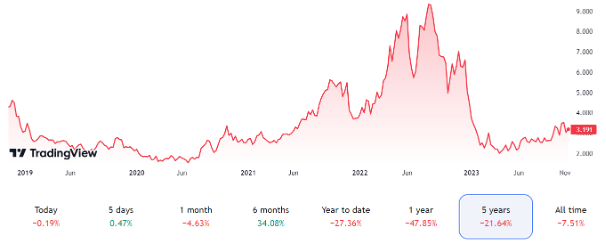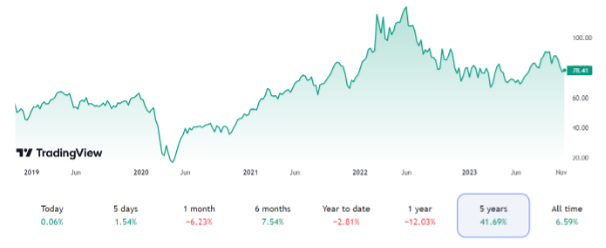The Israel-Hamas war could have a significant impact on global economic growth and inflation.
Oil and gas prices could be the perfect catalyst.
The daily oil supply of about 100 million barrels is what is needed for all to be well with the global economy. Natural gas consumption worldwide is roughly 3.94 trillion cubic meters. The top 3 oil and gas consuming countries are heavily dependent on oil imports and are carefully watching the developments in the oil- and gas-rich region of the Middle East.
Since the start of the Hamas-Israel conflict, oil prices have risen about 6%. European natural gas prices rose by 34% at their peak.
Should the conflict stay isolated
Effects of the conflict are directly proportional to its scope and escalation. The conflict’s effect on oil price should be limited if conditioned on the conflict being contained locally and not widening to the oil-rich region. In case of the “contained” scenario, free of entangling actors such as Iran, we should even see oil prices decline still further from current levels.
Nevertheless, during a “medium disruption” scenario — equivalent to the disruptions experienced during the Iraq war — the global oil supply of about 100 million barrels a day would decline by 3 million to 5 million barrels daily, driving oil prices up possibly by 35%.[1]
Iran, is a major player in oil production, accounting for around 4% of global supply despite sanctions imposed by the US in 2018, aimed at preventing Iranian oil exports.[2]
In case of a “major disruption” scenario, which would entangle local Middle East oil-producing actors and those with potential to disrupt distribution, we can even see a repeat of the 1973 oil crisis with disastrous effects on the global economy.
Macroeconomic factors at play
In order for the global economy to be humming along, it needs a constant supply of crude oil. 100 million barrels a day, to be exact. Conversely, if the most oil-thirsty economies are struggling, or not up to speed, the demand for oil drops, and with dropping demand, the price of this vital commodity also drops.
More than a month since the attacks, oil prices fell more than 4% to their lowest since late July. * The decline was caused by mixed economic data coming out of China. China's crude oil imports in October showed robust growth but its total exports of goods and services shrank at a faster pace. Chinese economic outlook was dampened by deteriorating demand in the country's largest export destination, the West.
Rising OPEC exports have also contributed to easing fears about tight markets. Yet another reason for the price drop was the strengthening dollar, which has an inverse relationship to oil price.[3] Thus with FED’s economic tightening, or threat thereof, comes a stronger greenback, which in turn exerts downward pressure on oil price.

Price of WTI crude oil over the past 5 years. (Source: Tradingview) *
Natural gas, like oil, is also vital to the global economy. Additionally, natural gas accounts for almost 95% of electricity generation in the Middle East and North Africa. The largest gas producing countries in Middle East are Iran, Qatar, and the UAE.
Since the Israel-Hamas conflict broke out, prices of natural gas have suffered increased volatility, with European natural gas prices up 34% at the peak. * Gas price increases have driven by a reduction in global LNG exports from Israeli gas fields and the current gas market being less able to absorb adverse supply shocks.
Filling the supply-demand gap
Despite the disruption of LNG production in Israel, there are other producers that can step in to fill the demand in the US and Europe.
Global LNG supply is expected to increase by 23 bcm in 2023, largely due to the ramp‑up of liquefaction projects in Africa and the United States.[4]
Europe is also preparing to receive more LNG from sources outside Russia, especially the US, as it expands its regasification capacity.[5] In the US, gas inventories were still expected to finish the 2023-24 winter season near five-year highs, at 1.77 trillion cubic feet.[6]

Price of Natgas over the past 5 years. (Source: Tradingview) *
Conclusion
During the 1973 Arab Israeli War, Arab members of the Organization of Petroleum Exporting Countries (OPEC) imposed an embargo against the United States. This led to severe disruptions in oil supply and shook the global economy.
The ongoing Israel-Hamas conflict is different. Firstly, the Israel-Hamas conflict isn't seeing involvement of major oil nations or key distribution routes, like the Strait of Hormuz that can be blocked by Iran. This makes the conflict contained, with some, although not devastating effects on the price of these globally vital commodities of oil and gas.
ARIFF AZRAEI BIN MOHAMMED KAMAL, Financial Analyst of Golden Brokers
* Past performance is no guarantee of future results.















